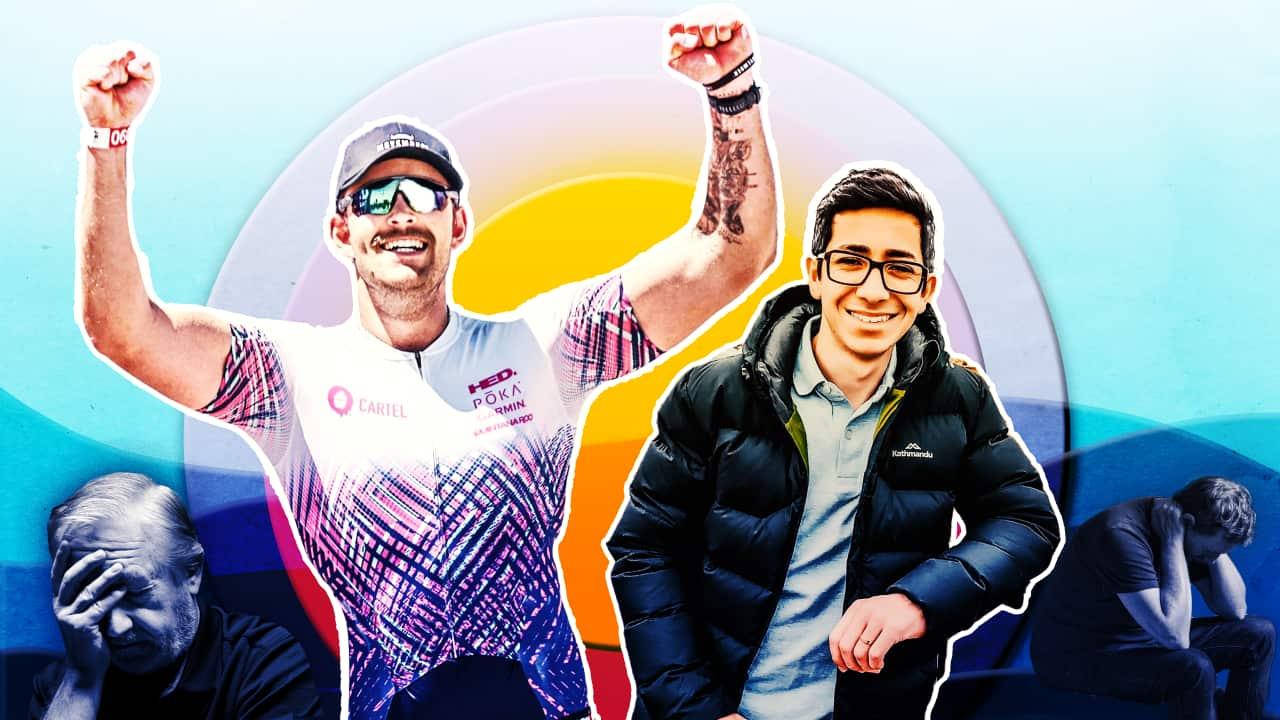Key Points
- Bruno Capella says he was ‘in denial’ about his mental ill health.
- Jacob Pratt spiralled into an eating disorder after childhood bullying.
- A quarter of all Australian men will experience a diagnosed mental health disorder in their lifetimes.
Disclaimer: The information in this article should not be used to diagnose, treat, cure or prevent any disease for therapeutic purposes as a substitute for professional medical advice. This article contains references to depression, anxiety and suicide.
Melbourne-based Bruno Capella said at the height of his mental health crisis, he could not be left alone, even to shower.
Capella, chief operating officer for a construction products manufacturing company, said he began experiencing severe anxiety and panic attacks in 2022 after the long lockdowns caused by the COVID-19 pandemic.
At first, he said he was in denial about his mental ill health because it didn't "fit" with his idea of his role as a man.
"It was much more linked to the issue of 'I'm a man, I need to be productive to live, I need to go after things that society imposes'. And that's when I hit rock bottom where no one wants to go, right?" he said.
Capella is among in Australia who experience a mental health disorder in their lifetimes.
In addition, men make up more than with an average of six males taking their own lives every day.
In Capella's case, he had arrived in Melbourne in 2020 with his wife Nicoly, and was quickly forced into the city's long lockdowns which occurred throughout that year and also 2021.

Bruno and Nicoly arrived in Australia in October 2020. Credit: Supplied
Brazil-born Capella said he "drastically" reduced contact with friends and family, and immersed himself in work, damaging his physical and mental health. Anxiety attacks began to occur with some frequency.
There was a night when my head wouldn't stop. I started pacing around the house and crying, and Nicoly cried next to me. Until I called a friend, he came, I vented, and he took us to his house for a while.Bruno Capella
He said he tried taking medication and saw doctors for physical check-ups but these did not show anything as being wrong.
"I felt like there was no turning back, that I had reached my limit. I could no longer take a shower alone. Nicoly literally had to sit in the bathroom with me because I was afraid of (what might happen)," he said.
In 2023, with psychological support and lifestyle changes involving exercise, diet and sleep, Capella restored his health, but with a renewed outlook on life.

Bruno Capella (fourth from left) emphasises the importance of being able to talk about mental health and having the support of friends and family in this process. Credit: Supplied
"Because without health, you won't get anywhere."
During November, movements such as and raise the issue of men's physical and mental health.
Bullying led to eating disorder
Jacob Pratt grew up in Queensland as a "normal" Australian boy, at least that’s what people would think when they saw him at school or home. But that’s not how he felt.
"I think, like a lot of men, it was quite a challenging childhood. I grew up obese, you kind of know you're different, people will tell you that quite often," he said.
"I remember being on the basketball court at school and getting thrown to the ground. (Also) On the bus, getting slapped in the face for no reason by other older kids. I remember going home and telling my mum, 'I want to end it all'."

Jacob Pratt says he was bullied as a child because he was obese. He advises men to "check in on your mates". Credit: Supplied
"At 17, I changed direction, but in the wrong way, when you try to change too quickly. And I spiralled into an eating disorder and was going to the gym three to four times a day just to try to lose weight," he said.
He said it was a friend from high school and the new friends from the gym who helped him strike a balance. "I started meeting people who had the same goals, and they helped me (get back on track)," he said.
has revealed that 51 per cent of men assumed they had or did suffer from poor mental health symptoms, but a third found it difficult to talk to someone about it.
Pratt, an e-commerce manager for a Melbourne-based beauty company, recently completed his first IronMan contest involving a 1.9km swim, 90km bike ride and 21.1km run.

Jacob Pratt struggled with several injuries leading up to IronMan 70.3 Melbourne, but decided to press on to remember that "we are stronger than our pain". Credit: Supplied
Social media had intensified the cultural problem by dictating what men should be, have, look like, and do, generating a crisis of male identity, he said.
"This has sparked gender movements and discussions that are essential, but which have placed men in a place without a clear definition of what it means to be a man today," Graneto said.
The addiction recovery specialist said men often sought out unhealthy ways to deal with mental pressures.
Alcohol, drugs, pornography, gambling or even a reluctance to grow up and become an adult are ways to escape the real problem.Walter Graneto, psychologist
The said that men were more likely to become addicted, with 11.5 per cent of boys and men over the age of 12 having a substance use disorder.
"It’s very difficult for a man, especially here in Australia, to reach out and ask for help," Graneto said.
Men were generally afraid of being criticised or ridiculed by other men or of "becoming a burden" by talking about their problems, he added.

More than a third of men find it difficult to talk about their feelings, citing "not wanting to burden others" (50 per cent), "embarrassment" (46 per cent), and "stigma" (40 per cent). Source: Moment RF / Djavan Rodriguez/Getty Images
"However, as a professional in the field, I can say that suicide can be prevented, not only through important support services but being able to talk to someone in a moment of crisis. (This) can save lives."
Readers seeking crisis support can contact on 13 11 14, the on 1300 659 467 and on 1800 55 1800 (for young people aged up to 25). More information and support with mental health is available at on 1300 22 4636.
To listen to the full podcast episode, click 'play' on this page, or listen on the SBS Portuguese profile on your favourite podcast app.












